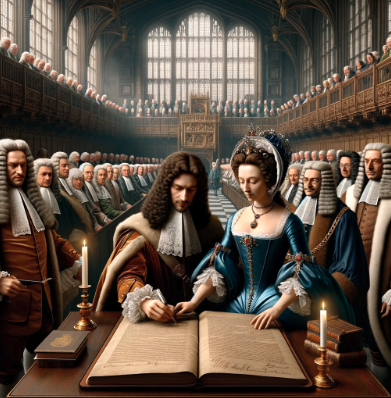
This is my third article on the historical antecedents of the United States Constitution. The Magna Carta and the Mayflower Compact have previously been addressed, plus a stop-over into the Rule in Bushell’s case (independence of the jury, freedom of assembly, and freedom of religion). Here, we get a two-for-one gift – the English Bill of Rights established not only Englishmen’s rights but also a restoration of the monarchy with parliamentary supremacy.
Historical Context and Events
The English Bill of Rights, enacted in 1689, emerged from intense political and religious turmoil in England. The 17th century was marked by a series of conflicts between Parliament and the monarchy, culminating in the English Civil War (1642-1651), the execution of Charles I, and the establishment of the Commonwealth under Oliver Cromwell.
After the restoration of the monarchy in 1660 with Charles II, tensions persisted, particularly over religious freedoms and the powers of the king versus Parliament. The situation reached a crisis point in 1688 with the Glorious Revolution, a bloodless coup that saw the Catholic King James II deposed and replaced by his Protestant daughter Mary and her husband, William of Orange.
The Bill of Rights was passed by the English Parliament to solidify the changes brought by the Glorious Revolution and to set clear limits on the powers of the monarchy.
Provisions of the English Bill of Rights
The English Bill of Rights included several key provisions that significantly altered the political landscape:
- Parliamentary Supremacy: It asserted the supremacy of Parliament over the monarchy. The king or queen could no longer suspend laws passed by Parliament or levy taxes without consent.
- Regular Parliaments: It mandated regular sessions of Parliament, ensuring that the king could not rule without Parliament for extended periods.
- Free Elections and Speech in Parliament: It established the right to free elections and the freedom of speech within Parliament, which was not to be questioned outside of it.
- No Cruel and Unusual Punishment prohibited cruel and unusual punishments and excessive bail.
- Right to Bear Arms: It granted Protestant citizens the right to bear arms for self-defense.
- Protestant Succession: It barred Catholics from the throne, a provision that reflected the religious conflicts of the time.
Impact on Constitutional Governance
The English Bill of Rights had a profound impact on the development of constitutional governance:
- Limiting Monarchical Power: Restricting the monarchy’s powers and affirming those of Parliament helped establish a constitutional monarchy in England.
- Model for Future Constitutions: Its principles influenced the development of constitutional documents in other parts of the world, notably in forming the United States Constitution and the Bill of Rights.
- Foundation for Modern Democracy: It laid foundational principles for a democratic government, such as the importance of regular elections and freedom of speech within the legislative process.
Effect on the Future
The English Bill of Rights’ legacy extends well into the modern era:
- Influencing Global Democratic Ideals: Its ideals have permeated global democratic thought and practice. Many of its provisions are echoed in the constitutional frameworks of numerous democratic countries.
- Legal Precedent: It serves as a critical legal document referenced in various legal contexts, affirming individual rights and the principles of constitutional rule.
- Cultural Impact: Beyond its legal implications, the Bill of Rights has shaped political culture, promoting values such as the rule of law, the separation of powers, and the rights of individuals against the state.
In conclusion, the English Bill of Rights stands not only as a pivotal document in British history but also as a cornerstone in the evolution of modern democratic governance. Its influence on constitutional law, individual rights, and the balance of power between the government and the governed continues to resonate worldwide.
Sourced: Wikipedia, History.com; edited with the assistance of Grammarly PRO and AI—computer-generated images.
Generated with AI assistance.